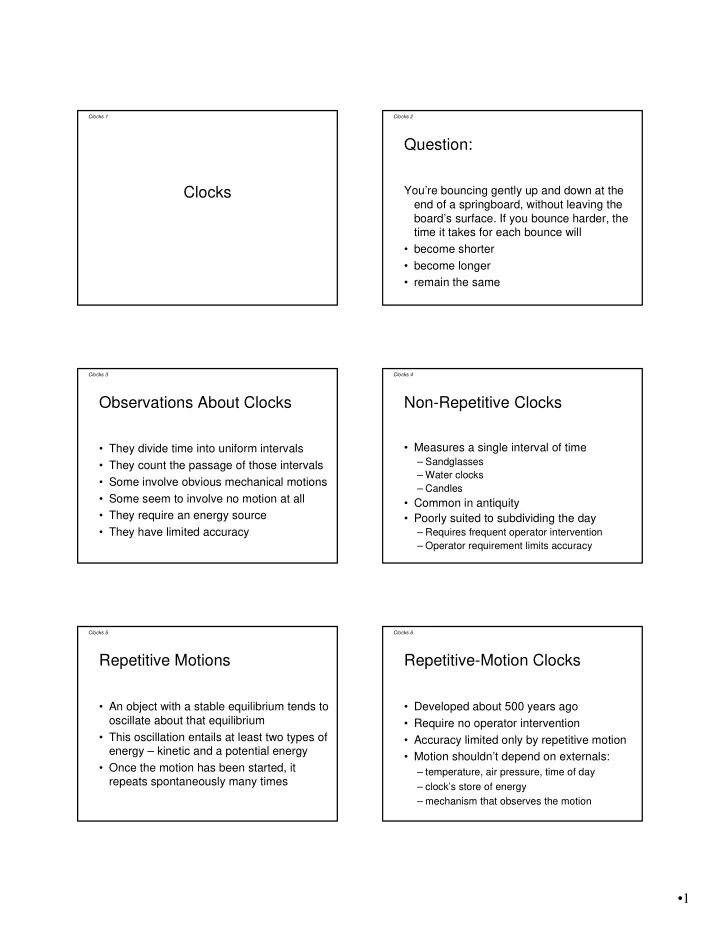

Clocks 1 Clocks 2 Question: Clocks You’re bouncing gently up and down at the end of a springboard, without leaving the board’s surface. If you bounce harder, the time it takes for each bounce will • become shorter • become longer • remain the same Clocks 3 Clocks 4 Observations About Clocks Non-Repetitive Clocks • Measures a single interval of time • They divide time into uniform intervals – Sandglasses • They count the passage of those intervals – Water clocks • Some involve obvious mechanical motions – Candles • Some seem to involve no motion at all • Common in antiquity • They require an energy source • Poorly suited to subdividing the day • They have limited accuracy – Requires frequent operator intervention – Operator requirement limits accuracy Clocks 5 Clocks 6 Repetitive Motions Repetitive-Motion Clocks • An object with a stable equilibrium tends to • Developed about 500 years ago oscillate about that equilibrium • Require no operator intervention • This oscillation entails at least two types of • Accuracy limited only by repetitive motion energy – kinetic and a potential energy • Motion shouldn’t depend on externals: • Once the motion has been started, it – temperature, air pressure, time of day repeats spontaneously many times – clock’s store of energy – mechanism that observes the motion •1
Clocks 7 Clocks 8 Some Specifics A Harmonic Oscillator • Terminology • A system with a stable equilibrium and a restoring force that’s proportional to its – Period: time of full repetitive motion cycle distortion away from that equilibrium – Frequency: cycles completed per unit of time • A period that’s independent of amplitude – Amplitude: peak extent of repetitive motion • Application • Examples: – In an ideal clock, the repetitive motion’s – Pendulum period shouldn’t depend on its amplitude – Mass on a spring Clocks 9 Clocks 10 Question: Limits to the Accuracy You’re bouncing gently up and down at the • Fundamental limits: end of a springboard, without leaving the – Oscillation decay limits preciseness of period board’s surface. If you bounce harder, the • Practical Limits: time it takes for each bounce will – Sustaining motion can influence the period • become shorter – Observing the period can influence the period • become longer – Sensitivity to temperature, pressure, wind, … • remain the same Clocks 11 Clocks 12 Pendulums Pendulum Clocks • Pendulum is clock’s timekeeper • Pendulum (almost) a harmonic oscillator • For accuracy, the pendulum • Period proportional to (length/gravity) 1/2 – pivot–center-of-gravity distance is • Period (almost) independent of amplitude • temperature stabilized • adjustable for local gravity effects – streamlined to minimize air drag – motion sustained, measured gently • Limitation: clock mustn't move •2
Clocks 13 Clocks 14 Balance Ring Clocks Quartz Oscillators, Part 1 • A torsional spring causes a balance-ring • Crystalline quartz is a harmonic oscillator harmonic oscillator to twist back and forth – Crystal provides the inertial mass • Gravity exerts no torque about the ring’s – Stiffness provides restoring force pivot and has no influence on the period • Oscillation decay is extremely slow • Twisting is sustained and • Fundamental accuracy is very high measured with minimal effects on the ring’s motion Clocks 15 Clocks 16 Quartz Oscillators, Part 2 Quartz Clocks • Electronic system starts crystal vibrating • Quartz is piezoelectric • Vibrating crystal triggers electronic counter – mechanical and electrical changes coupled • Nearly insensitive to gravity, temperature, – motion is induced and measured electrically pressure, and acceleration • Slow vibration decay leads to precise period • Tuning-fork shape yields slow, efficient vibration Clocks 17 Summary About Clocks • Most clocks involve harmonic oscillators • Amplitude independence aids accuracy • Clock sustains and counts oscillations • Oscillators that lose little energy work best •3
Recommend
More recommend